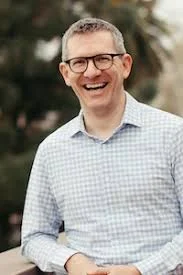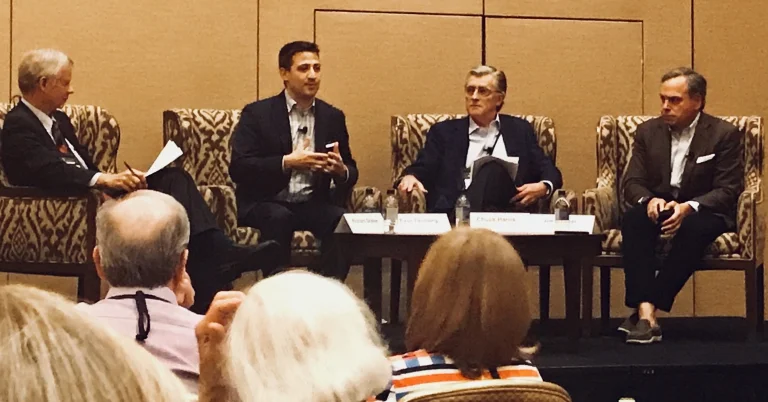3 Highlights from Philanthropy Roundtable’s 2017 Annual Conference
This year’s Philanthropy Roundtable Annual Conference held in Scottsdale, Arizona, was attended by hundreds of foundation representatives from across the country. The conference featured insightful speakers across a variety of disciplines who brought unique perspectives to the themes, challenges, and opportunities of today’s philanthropic sector.
Three sessions in particular touched on topics relevant to current conversations underway in the Fort Worth community. Those three sessions addressed:
- Building Character in the Age of Technology
- Supporting Charter School Infrastructure
- Amplifying Impact by Aggregating Funder Resources
1) Building Character in the Age of Technology
A dynamic speaker and riveting topic addressed one of the biggest conundrums facing families, businesses, policymakers, and schools in our current age: how the pervasion of technology is impacting the development of our children and the spaces where they learn, grow, and build the foundation of their character.
Andy Crouch is an author and expert on this topic, his most recent book entitled, The Tech-Wise Family: Everyday Steps for Putting Technology in Its Proper Place.
Andy delved into the challenge of character formation in our current environment, which he terms the “Tech Everywhere” (and later re-frames as the “Easy Everywhere”) era. He began by acknowledging the notion that technology inherently brought with it a promise of an easier life – and yet many individuals and families are more unhappy and less fulfilled with the advent of this “Easy Everywhere” existence.
His mission is to unravel the question of how we build individuals, families, and communities of character in the midst of technologies that tempt us away from investing deeply relationships and engaging in the struggle of truly developing ourselves.
A few key points (and some reflective questions) Andy illuminated around this concept included:
- Engaging Heart, Soul, Mind, and Strength. Andy posed that humans are made of heart, soul, mind and strength – we are developing and truly becoming when we are engaging all four of these facets. Andy noted that in prior generations, many of the daily struggles required an engagement of heart, soul, mind, and strength – from fixing a car to cooking a meal. Today, with the introduction of automation, technology, and “Easy Everywhere” availability, we do not have to engage in these kinds of “struggles” – in fact, we can fairly easily avoid them. Devices and technology, while they disburden us, also disengage us.
- Reflection: What are the activities today that still engage our heart, soul, mind and strength? How can we bring those activities to the forefront of our work in our local communities and particularly in the education arena?
- Valuing Formative (vs. Non-formative) Environments. All of us experience formative environments in our upbringing – such as our family home, school, or church. These are places that make us different – they actually help form who we are, how we think, and how we interact with other people and the world around us. Technology is non-formative. As Andy stated, “technology can be good at expressing human capacities, but it is not good at developing them.” He referenced the example of texting vs. talking in person. With texting, Andy shared, we are absorbing kilobytes of information – we are fully in control of our message, timing, and tone. In an in-person conversation, we are absorbing terabytes of information – about the person’s nonverbal cues, hand gestures, intonation, etc. – and we cannot control how the conversation ebbs and flows or exactly how we will react to it.
- Reflection: What are we losing by defaulting to the “Easy Everywhere” option? How can we challenge ourselves (and those places in which we work and influence) to step toward instead the vulnerability of formative opportunities and approaches?
- Building Wisdom, Skill, and Courage. Andy references these three qualities as aspirations for his family. He defines wisdom as coming from knowing and being known. (Devices can prevent us from knowing and being known.) Skill is when we develop an ability over time through play, practice, and persistence. (He contrasts playing an instrument vs. pressing “play” on Spotify to listen to music.) He cultivates courage in his home by encouraging his children to ask the question, “Will this (device/program/technology) make me less foolish and more wise? Less fearful and more courageous?”
- Reflection: Are we willing to bear some pain, discomfort, or struggle to build and become the people and citizenry we want to be? How can we be advocates of this process across the areas where we invest (particularly in education)?
- Reflection: Are we willing to bear some pain, discomfort, or struggle to build and become the people and citizenry we want to be? How can we be advocates of this process across the areas where we invest (particularly in education)?
2) Supporting Charter School Infrastructure
As more charter school networks seek to establish or expand their presence in the Fort Worth area, a session moderated by Romy Drucker, co-founder and CEO of The 74, was a helpful reminder of the importance of tending to a charter school’s infrastructure (in addition to its funding model and academic curriculum) to ensure sustainability and quality teacher retention.
The three key areas of focus this panel emphasized for building strong infrastructures included:
- Helping charter schools establish best-in-class processes and procedures, compensation and benefits structures, and HR and financial policies to protect against vulnerability areas that can lead to unwanted negative publicity and/or damaging external messaging
- Assisting with principal/leadership turnover communications to provide a cohesive network voice during times of transition in order to minimize internal teacher and external stakeholder confusion or concern
- Supporting teacher and staff training and communications about the role of the charter school in the overall local education ecosystem, the benefits of the charter school’s governance/Board structure, and unique opportunities available under the charter school model
Currently, there are ongoing local conversations in Fort Worth about how we will successfully support and integrate charter schools into our community in the near future. This panel’s message of proactively addressing more visible strategic issues (like geographic locations and community messaging) as well as critical internal infrastructure systems and processes was a timely one.
3) Amplifying Impact Through Multi-Funder Capital Aggregation
A session focused on impact-driven philanthropy spotlighted an innovative model for tackling some of philanthropy’s biggest challenges and bringing effective solutions to scale.
Blue Meridian Partners is a partnership of philanthropists that has combined funding to focus large investments (up to $200 million) on the most promising interventions helping children in poverty. Blue Meridian is currently comprised of 12 philanthropic institutions and individuals and is incubated at the Edna McConnell Clark Foundation in New York.
Blue Meridian Partners pools resources and invests more than $1 billion in exceptional strategies poised to make a national impact. The investments are “big bets” – flexible, unrestricted, long-term (5-10 years), and with payout tied to performance.
In addition to Chuck Harris, COO and managing director of Blue Meridian, the Philanthropy Roundtable panel included Evan Feinberg, Executive Director of Stand Together. Stand Together identifies and cultivates promising organizations with the potential for scalable impact, and invests in these organizations by connecting them to a network of like-minded peers, mentors and donors for shared training, financial support, and consulting.
During the panel discussion, Evan outlined three specific ingredients for successful collaboration:
- Shared vision
- Shared values
- Complementary capabilities
This “recipe for success” resonated at a local level, given the extensive collaborative work that Fort Worth has undertaken in its early education efforts, including Read Fort Worth, Early Learning Alliance, and the Raising of Fort Worth, to name a few.
We appreciated the opportunity to hear from a variety of experts at Philanthropy Roundtable who shared their experience and posed questions that challenged our thinking and provoked us to consider new models and ideas for impact.
To learn more about Philanthropy Roundtable’s 2017 Annual Conference sessions and speakers, visit www.philanthropyroundtable.org.


